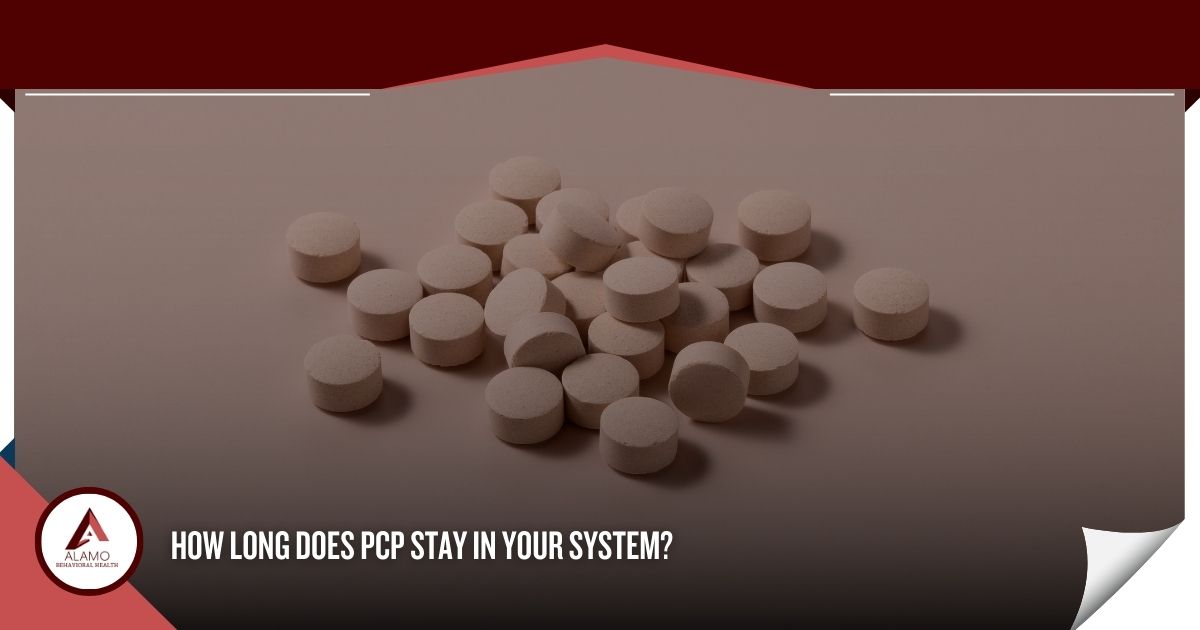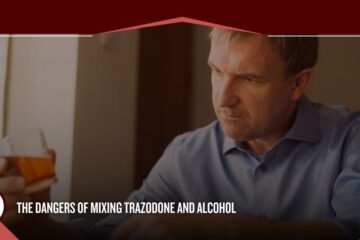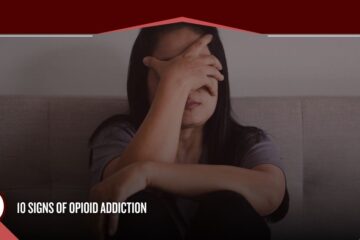PCP is a dissociative anesthetic drug. In the 1920s, doctors used it as a general anesthetic during medical procedures. In the 1960s, people began manufacturing it in illegal labs. By the 1970s, PCP use was common in the United States.
Research shows that PCP-related emergency department visits have risen significantly in recent years. The use of this dangerous drug is spreading, especially among adults aged 25 to 34. It is essential to recognize the risks associated with PCP abuse and seek treatment as soon as possible to avoid severe consequences.
This article will explore PCP abuse and how long the drug stays in your system. You will learn how long drug tests can detect PCP in urine and more.
Reach out to the Alamo Behavioral Health specialists now to learn about our treatment programs. Our intake specialists will verify your insurance, answer questions, and help you schedule appointments. Contact us now to start your recovery journey.
What is PCP?
Phencyclidine (PCP) is a powerful, illicit drug. People use PCP recreationally for its dissociative effects.
Common street names for PCP include:
- Angel Dust
- Rocket Fuel
- Supergrass
- Peace Pill
- Ozone
- Love Boat
- Magic Dust
- Bella Donna
The dissociative effects of PCP can put users at immediate risk for harm. People who use it frequently may develop symptoms of addiction, including:
- Tolerance
- Physical dependence
- Withdrawal symptoms
- Cravings
PCP users are also at risk of overdose or toxicity. Heavy, prolonged PCP abuse can lead to:
- Liver damage
- Hyperthermia
- Seizures
- Muscle tissue damage
- Kidney failure
It is important to seek treatment as soon as you recognize the signs of PCP abuse or addiction.
The Effects of PCP
PCP users may abuse the drug for its dissociative effects. Low to moderate doses of PCP may produce physical and psychological effects that include:
- Altered perceptions
- Feelings of detachment from the environment or self
- Seeing or hearing things that aren’t there
- Disorientation
- Confusion
- Dizziness
- Nausea
- Vomiting
- Excessive facial sweating
- Loss of coordination
- Difficulty moving
- Numbness in the feet and hands
- Elevated heart rate, body temperature, blood pressure, and breathing
People who take higher doses of PCP may experience other physical and mental health side effects, including:
- Fear
- Anxiety
- Panic
- Disordered thinking
- Violent behaviors
- Severe muscle spasms
- Seizures
- Exaggerated strength
- Coma
- Death
People may continue to experience side effects of PCP abuse for a year or more after they quit using it. These side effects may include:
- Anxiety
- Memory problems
- Depression with suicidal thoughts
- Speech problems
- Social withdrawal
These lingering effects can make people feel miserable. Many people with PCP use disorder need ongoing treatment and support to manage their symptoms and avoid relapse.
How Long Does PCP Stay in Your Body?
As soon as you stop using PCP, your body will begin to eliminate it. Most people start to experience withdrawal symptoms within about 8 hours of their final dose of PCP. Acute withdrawal symptoms may include:
- Sweating
- Headache
- Agitation
- Anxiety
- Muscle twitching
- Elevated body temperature
- Diarrhea
- Restlessness
- Fear
Many people continue to experience withdrawal symptoms for months or even a year after they quit using PCP. Long-term withdrawal symptoms may include:
- Weight loss
- Memory problems
- Depression
- Suicidal thoughts
- Mood disorders
- Sleep problems
Experiencing withdrawal symptoms does not mean that PCP is still present in the body. People may experience withdrawal symptoms as their body returns to its natural state after drug abuse.
Drug testing can effectively determine if PCP is present in the body. Detection times vary depending on the method of testing.
How Long Can Drug Tests Detect PCP?
People undergo drug testing for many reasons. They may need to test at work or as part of a substance use disorder treatment program.
PCP can be detected in several types of drug screening tests. Here is an overview of some common tests for PCP.
Urine test
Urine testing is one of the most common forms of drug screening in the United States. Urine tests can detect PCP for up to 14 days after you last use it.
Blood testing
Blood tests are most common in an emergency room setting and can typically detect PCP for up to 24 hours after your last dose.
Saliva test
Saliva tests may be able to detect PCP for up to 10 days after your last dose of the drug.
Hair test
Hair tests are uncommon, but they provide the longest window of detection. A hair test may be able to detect PCP for up to 90 days after your last dose.
Many factors can affect how long PCP is detectable. These include your age, metabolism, and other substances you use simultaneously.
Find Help Now
If you or someone you love abuses PCP or other addictive drugs, you are not alone. Effective, comprehensive treatment is available at Alamo Behavioral Health.
Contact our intake specialists now to explore your treatment options or schedule an evaluation.




